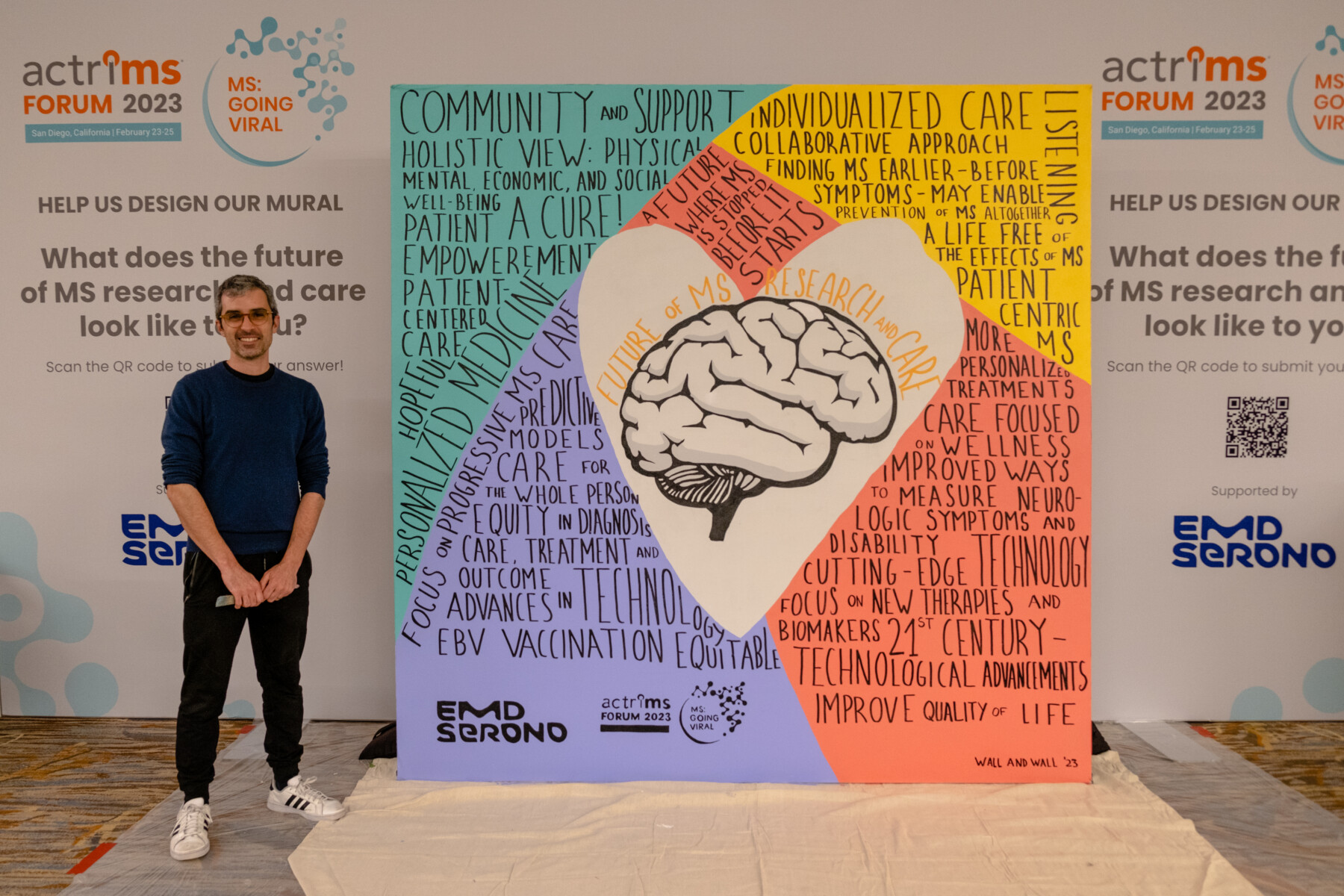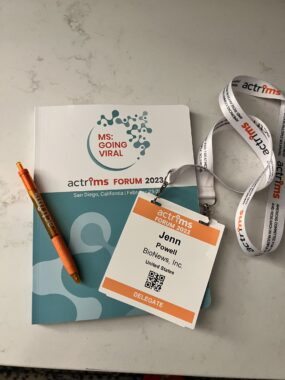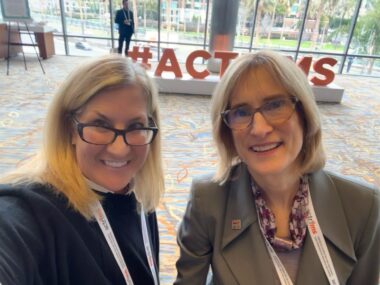ACTRIMS 2023: Learning, lectures, and leaving with hope
Jenn Powell, who lives with MS, sums up ACTRIMS from a patient perspective

Artist Ferran Torras stands next to the mural he created at the ACTRIMS Forum 2023, inscribed with words from attendees describing the future of MS research and care.
Even the cold and rainy Southern California weather did little to dampen the excitement of the more than 1,800 attendees converging on the Marriott Marquis San Diego Marina. People filtered in, eager for the meeting to begin. Excitement reached a fever pitch Thursday morning as the curriculum came to life. This was ACTRIMS.
The eighth annual Americas Committee for Treatment and Research in Multiple Sclerosis (ACTRIMS) Forum 2023 was held Feb. 23-25 in San Diego. The ACTRIMS Forum is a translational science meeting focusing on scientific discoveries made in multiple sclerosis (MS) to advance the understanding of research and clinical care of patients with MS.
‘MS Going Viral’ at ACTRIMS
The ACTRIMS format is unique. Unlike many conferences, the forum selects one area of expertise. Clinicians, researchers, and educators offer presentations surrounding this topic, although they may submit abstracts on any MS research area.
The theme this year was “MS Going Viral.” A play on words, the theme focused on the role viruses play in the immune-mediated process, the Epstein-Barr virus (EBV) and the discovery of its role in MS, the interaction between viruses and MS disease-modifying therapies, how the COVID-19 virus presents differently in those with MS, and how technological advances in artificial intelligence and data collection broadens our global reach and inclusivity.
 With the lanyard over my head, I could not help but smile at my name badge. Some of the most innovative thought leaders, clinicians, and researchers stood within feet. I knew of many from my hours of reading about MS research and drug development. The possibility of a cure for MS was somehow closer.
With the lanyard over my head, I could not help but smile at my name badge. Some of the most innovative thought leaders, clinicians, and researchers stood within feet. I knew of many from my hours of reading about MS research and drug development. The possibility of a cure for MS was somehow closer.
As I walked around the venue to get my bearings, I came across a blank canvas. Next to the canvas was a banner with a QR code to submit an answer to the question, “What does the future of MS research and care look like to you?” I made a note to submit mine before the forum ended.
Let the lectures begin
There I was among some of the brightest minds in MS and demyelinating diseases. I felt a sense of excitement as I began to sort out my schedule. As someone with advanced MS, I chose carefully as I knew my body would only last so long.
Daniel Ontaneda, MD, PhD, a neurologist at the Cleveland Clinic Mellen Center for Multiple Sclerosis, gave a lecture on reversing neurodegeneration that was both informative and inspiring. The ability to regenerate disabling damage is something I had thought to be impossible.
With my recent diagnosis of advanced MS, there is not a day that goes by where I don’t wonder if the clock could be turned back on my disability, if not in time for me, certainly for the next generation. Hearing the science behind this concept left me inspired.
Lawrence Steinman, MD, professor of neurology and neurological sciences, pediatrics, and genetics, at Stanford University, gave the Kenneth P. Johnson Memorial Lecture. He spoke about EBV being the leading risk factor for developing MS, citing a 2022 study showing that EBV triggers MS by causing the immune system to attack itself.
I had EBV, which causes infectious mononucleosis, before my MS diagnosis. I was sick for many months before waking one day unable to speak, move, or talk. Within a few weeks, I was diagnosed with MS.
MS in African Americans
Mitzi Joi Williams, MD, is a practicing neurologist and game-changer when it comes to equitability among African Americans with MS. I have followed her podcast and chats for more than a year, learning about the unique challenges facing those with MS in the African American community. Williams joined a panel of speakers at the premiere of the documentary, “MS in Black and African Americans,” a poignant and powerful film that follows the stories and experiences of Tyler Campbell and Dawn Morgan, both living with MS.
I paused to think about a global MS population, not just the community at my front door. MS is indiscriminate, yet the inequities are many. I highly recommend this documentary as a starting point to learn.
“Everybody must do their part,” Williams said, when I asked how I could help. “One person can’t boil the ocean, but if we all try to raise awareness about those areas we are passionate about, each working in our spheres of influence, the work begins to get done.”
Living with and learning about MS
By noon each day, my iWatch signaled I had met my daily goal of walking 1 mile. Although I usually walk 3 miles, my knee replacement only five weeks earlier limited my mobility. I was getting fatigued and knew I needed to take care of myself to maximize my positive experience. After 14 years with now secondary progressive MS, I understand how important it is to treat the mind, body, and spirit.
Ruth Ann Marrie, MD, a neurologist and researcher from the University of Manitoba in Canada, was the recipient of the National Multiple Sclerosis Society’s Barancik Prize for Innovation in MS. She spoke on the importance of treating the whole person with MS — body, mind, and spirit.

Jenn meets the president of the National Multiple Sclerosis Society, Cyndi Zagieboylo.
“Dr. Marrie’s research and clinical practice focus on the whole person. Her research shows that routine medical care, especially treating high blood pressure, diabetes, and depression, holds off MS symptoms and increases the quality of life,” said Cyndi Zagieboylo, president and CEO of the National MS Society.
I sat with Zagieboylo as we further discussed how to accelerate progress. She joined me as a guest on The Multiple Sclerosis Podcast in 2022; however, we had never met in person. Doing so was one of the highlights of my visit.
The best of humanity
The past few days illustrated the best in humanity. People are fighting to find a cure for each of us with MS and other demyelinating diseases.
“This year’s forum was a perfect display of the ACTRIMS mission — to build a community that advances the science and treatment of MS. When researchers and clinicians and people affected by MS come together, we accelerate progress,” Zagieboylo said.
I returned to the canvas on my way home. It was no longer blank. A heart surrounded by descriptive words now covered the canvas. I scanned the words until my eyes caught one: “Hopeful.”
And I am.
Note: The Multiple Sclerosis News Today team is providing in-depth coverage of the ACTRIMS Forum 2023 Feb. 23–25. Go here to see the latest stories from the conference. Follow along on Facebook, Twitter, and Instagram for live updates using the hashtag #actrims2023.






Mary Beth Davis
Hi, I am a co-leader for a MS Self-help group in Springfield, VA. We meet via Zoom only. I was wondering if you could speak to our group and share what you've learned about ACTRIMS?. There are 6-10 of us and we are all ages and stages. We meet on the 3rd Sat from 10:30am-12:30pm EST. We have Mar. 18 and Apr 15 and you can join us for 30-45 mins. Let me know! THANK YOU
Jenn
Hello Mary Beth,
Thank you so much for reading and reaching out. I would be honored to speak to your group. Please send me an email at [email protected] and we can find a time that works.
Thank you!
Best,
Jenn
Ed Tobias
Hi Mary Beth - I hope you and Jenn can work out something. She's great and I'm sure she'll add a lot if you can coordinate a date and time. Ed